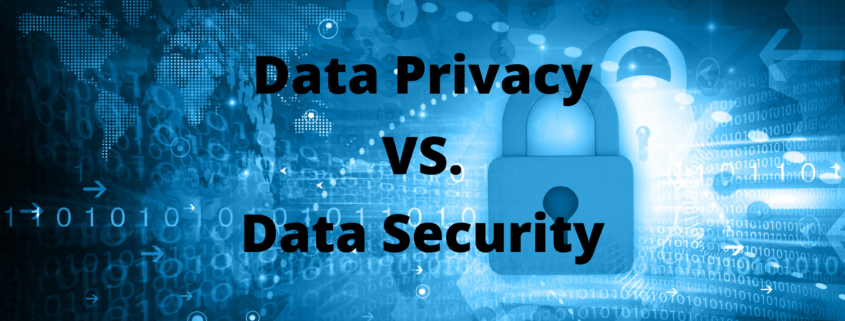Data Privacy Versus Data Security
Companies are collecting and storing more information than ever before, cementing the importance of both data privacy and data security.
Now more than ever it’s critical to protect confidential information and ensure business continuity through a robust data protection strategy. We should cover the key concepts of data privacy and data security to help differentiate the two.
The terms data privacy and data security are often misunderstood and used interchangeably. However, they are two separate concepts that work in tandem to keep data safe!
Data privacy focuses on how information is handled, stored, and used. While data security is concerned with protecting your organization’s assets.
Understanding Data Privacy
Data privacy laws have been around since 1998 emerging as regulations put in place by governments to ensure data is responsibly handled. These regulations dictate how information is to be collected, processed, stored, and disseminated. Companies that operate internationally or collect & store data should, at a minimum, comply with the following privacy regulations:
- General Data Protection Regulation (GDPR)
- California Consumer Privacy Act (CCPA)
- Health Insurance Portability and Accountability Act (HIPAA)
- Payment Card Industry Data Security Standard (PCI DSS)
- Children’s Online Privacy Protection Act (COPPA)
This is not a complete list of all regulations that should be considered.
These regulations have been put in place to enhance and protect consumers and their right to personal privacy.
These laws give people the right to know what information a company will be collecting, why they are collecting it, and how it will be processed. Data privacy regulations are growing globally and becoming more complex, which is forcing privacy requirements to evolve and grow as well.
Non-compliance with these laws has proven very costly for companies in the past. In 2019, Google was fined $57 million under the European Union’s GDPR law.
Importance of Data Privacy
Data privacy is an individual’s right to control who has access to personal information and how it should be used.
Data privacy also prevents organizations from selling or redistributing individuals’ personal information to third parties.
When an organization actively collects customer data, it is the sole responsibility of the organization to protect and preserve their clients’ sensitive information.
Not having a privacy policy in place or failure to comply with privacy laws can lead to severe consequences, apart from legal actions and financial loss.
Understanding Data Security
What is data security? It is the process of protecting information from unauthorized access, data corruption, and data loss.
What is a data security process? It is a process that includes various techniques, data management practices, and technologies that act as defense mechanisms to protect data from internal and external threats.
Data security is focused on what an organization does with customer data once collected. More specifically, where is the data stored, how is it stored, and how is access to that information regulated?
A comprehensive data security strategy will help prevent data breaches, ensure business continuity and keep your company’s data safe from cyberthreats.
Importance of Data Security
The term “data is the new oil,” coined by Clive Robert Humby in 2006, stands true in today’s competitive business environment. Data security is vital for a business’s day-to-day operations to run smoothly and successfully.
Protecting your brand’s image and value is difficult if you fail to protect your organization’s confidential data. This also can result in regulatory fees & fines, or worst-case, go out of business.
Data security policy has been forced towards the top of organizations’ priority list due to the alarming rate that cyberattacks are growing. It is estimated that organizational spending on cybersecurity will reach $123 billion in 2020.
Depending on the purpose, type of industry, or geographical location, your business can implement the following security compliance frameworks and international standards:
- National Institute of Standards and Technology (NIST)
- the International Organization for Standardization (ISO)
- Payment Card Industry Data Security Standard (PCI DSS)
These frameworks provide guidance and best practices for information security to help you assess IT security measures, manage risks, respond to security incidents and improve your information security management system.
Difference Between Data Privacy and Data Security
Data privacy and data security are two sides of the same coin. They have distinct concepts but are closely related. Achieving data security doesn’t ensure data privacy and vice versa, but both are required to establish a comprehensive data protection strategy.
Let’s distinguish the two concepts with a hypothetical example:
Assume you own a laptop where you keep personal or private information. Most likely, you’ll want to keep this data safe. To prevent people from access your information, you put a sticker on the cover of your laptop that reads ‘Do Not Touch’. But just in case people don’t read or ignore the sticker, you want to add an extra layer of privacy, so you locked the computer with a secure password.
Now, there are two things to note in this hypothetical example. First, the ‘Do Not Touch’ sticker tells people to keep away from your laptop, thereby authorizing your privacy (data privacy). Second, the password ensures no one can access your data, thereby protecting your data from unauthorized access (data security).
How To Achieve Data Privacy and Security While Being Legally Compliant
Achieving data privacy and data security and complying with several laws have their own set of challenges. Even large organizations struggle to understand and implement the proper security management and compliance measures.
But that shouldn’t be the same for your business. To learn how you can achieve and maintain compliance for data privacy and security, contact Data-Tech, one of the foremost Tampa IT Services Providers.




